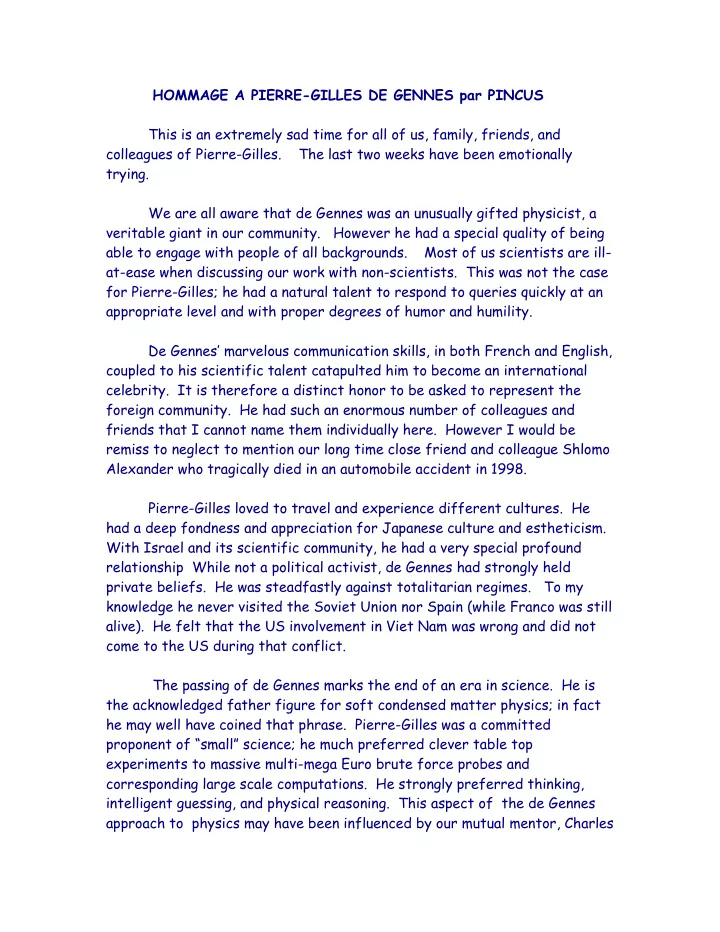

HOMMAGE A PIERRE-GILLES DE GENNES par PINCUS This is an extremely sad time for all of us, family, friends, and colleagues of Pierre-Gilles. The last two weeks have been emotionally trying. We are all aware that de Gennes was an unusually gifted physicist, a veritable giant in our community. However he had a special quality of being able to engage with people of all backgrounds. Most of us scientists are ill- at-ease when discussing our work with non-scientists. This was not the case for Pierre-Gilles; he had a natural talent to respond to queries quickly at an appropriate level and with proper degrees of humor and humility. De Gennes’ marvelous communication skills, in both French and English, coupled to his scientific talent catapulted him to become an international celebrity. It is therefore a distinct honor to be asked to represent the foreign community. He had such an enormous number of colleagues and friends that I cannot name them individually here. However I would be remiss to neglect to mention our long time close friend and colleague Shlomo Alexander who tragically died in an automobile accident in 1998. Pierre-Gilles loved to travel and experience different cultures. He had a deep fondness and appreciation for Japanese culture and estheticism. With Israel and its scientific community, he had a very special profound relationship While not a political activist, de Gennes had strongly held private beliefs. He was steadfastly against totalitarian regimes. To my knowledge he never visited the Soviet Union nor Spain (while Franco was still alive). He felt that the US involvement in Viet Nam was wrong and did not come to the US during that conflict. The passing of de Gennes marks the end of an era in science. He is the acknowledged father figure for soft condensed matter physics; in fact he may well have coined that phrase. Pierre-Gilles was a committed proponent of “small” science; he much preferred clever table top experiments to massive multi-mega Euro brute force probes and corresponding large scale computations. He strongly preferred thinking, intelligent guessing, and physical reasoning. This aspect of the de Gennes approach to physics may have been influenced by our mutual mentor, Charles
Kittel, who constantly insisted that we should know the answer to a theoretical problem in advance on physical grounds and only perform the detailed calculations for the 2’s and π’s. The beginning of my personal friendship with Pierre-Gilles dates from 1958 when he and Annie came to spend six months in Berkeley with Charlie Kittel’s group where I was a graduate student. While PG and I were not collaborating (he was working with another student in the group), we somehow managed to go swimming most noons at the, then new, Strawberry Canyon Recreation Center with the celebrated Miss Sunshine. During this period he was engrossed in digesting the works of the Russian school in the theory of superconductivity. There were many instances when we had agreed to go out to the theatre and dinner that he sent Annie but he, himself, stayed home to work on Abrikosov. Of course this effort resulted, shortly thereafter, in the famous Orsay Superconductivity Group. There was one episode during the Berkeley period which alerted me to the fact the de Gennes was indeed a special intellect. You should be aware that to a graduate student anyone more senior seemed unattainably brilliant; so, at that time, PG was not special to me as a physicist, only a good “buddy”. In 1958, W. Pauli was spending a sabbatical year in Berkeley. He was a very overbearing intense personality. Kei Yosida, another post–doc in the Kittel group, was scheduled to give a colloquium to the entire Physics Department where he was to explain the new BCS theory of superconductivity. It was a large, jam-packed amphitheatre with Pauli in the first row. PG and I happened to walk in together and were sitting toward the rear. In the first five minutes of the lecture, Pauli stood and asked a question in a very aggressive manner. Yoshida’s response did not satisfy him and he became quite agitated (I understood nothing of the physics that was involved). The result was that Yosida froze and there was a long uncomfortable silence. PG leaned over to me and whispered, “… maybe I should say something.” He then slowly stood up are started with “Maybe I can help clarify the situation. I believe that what was meant …….” Whatever he said seemed to calm Pauli which allowed Yosida to continue his lecture. Obviously, this incident has stayed with me and made me instantly proud to be PG’s “buddy”. By the way, de Gennes claimed to not recall this event, but I assure you that it happened.
The post-Orsay, College de France time frame coincided with de Gennes’ explosive period in soft matter. He was lecturing extensively around the world and introduced his unique version of science into the US community. His brief visits to the Exxon Research Laboratory nucleated the American soft matter “school”. De Gennes and I remained close for this last nearly half century. We shared many private moments and had fun making bets on physics (I usually lost!). It is difficult for me to adequately describe my sense of loss.
Recommend
More recommend